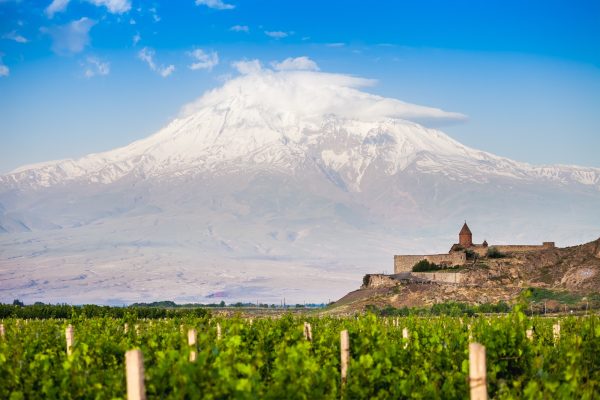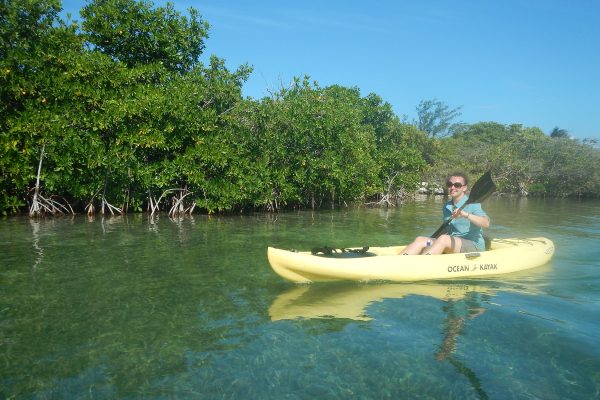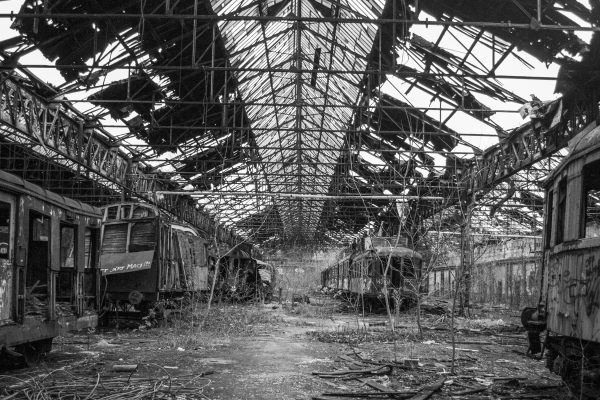Trip duration: 2 weeks | Approx cost: £850 | When: Spring
Doinit factor: Find yourself emerged in ancient lands – on a tidy budget.
Backpackers have long travelled the classic overland route. With so many variations and detours the opportunities to explore this region are almost endless, but for me I’ve got 16 days off work to go on an intense adventure of a lifetime.
Setting off from Istanbul
Our story starts in the city which spans two continents. For centuries Istanbul or Constantinople as it used to be known has served as a gateway to the Middle East. It’s a great transport hub boasting two airports and numerous options to arrive via land or sea. I’d urge anyone embarking on an eastbound route to land on the European side, why?, it gives you the opportunity to cross the Bosporus, the body of water separating the two sides of the city. Local ferries criss-cross all day and this provides for a symbolic gesture, a right of passage of sorts, crossing the confines of ‘safe’ Europe and blazing your trail to lands far from home.Istanbul itself has plenty to offer; in fact it makes for a fantastic city break. With Grand Bazaar, Hagia Sofia, Blue Mosque, Basilica Cistern and much more on offer it would be easy to stay put, but unfortunately train schedule changes mean we only have one night here and the next morning, instead of exploring the city, we’re running in the rain to catch the ferry and then the train. On the Asian side we come to the grand 18th century Haydarpaşa train station building, a gift from an Austrian Emperor.
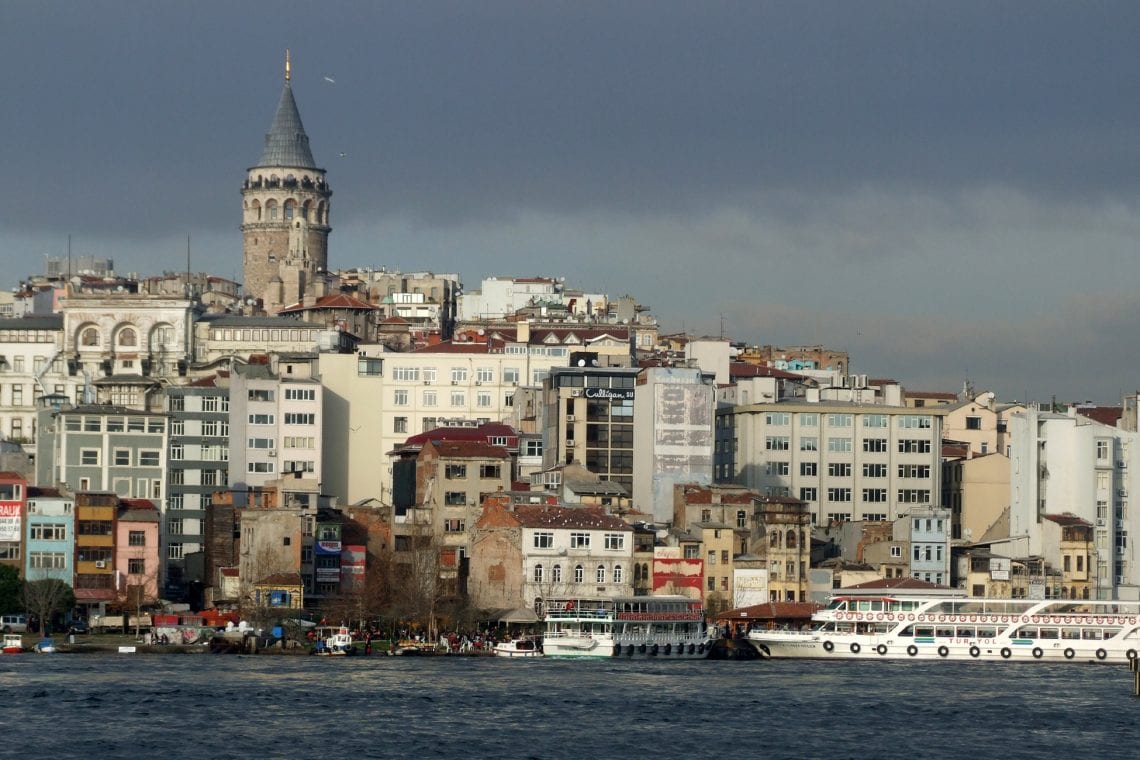
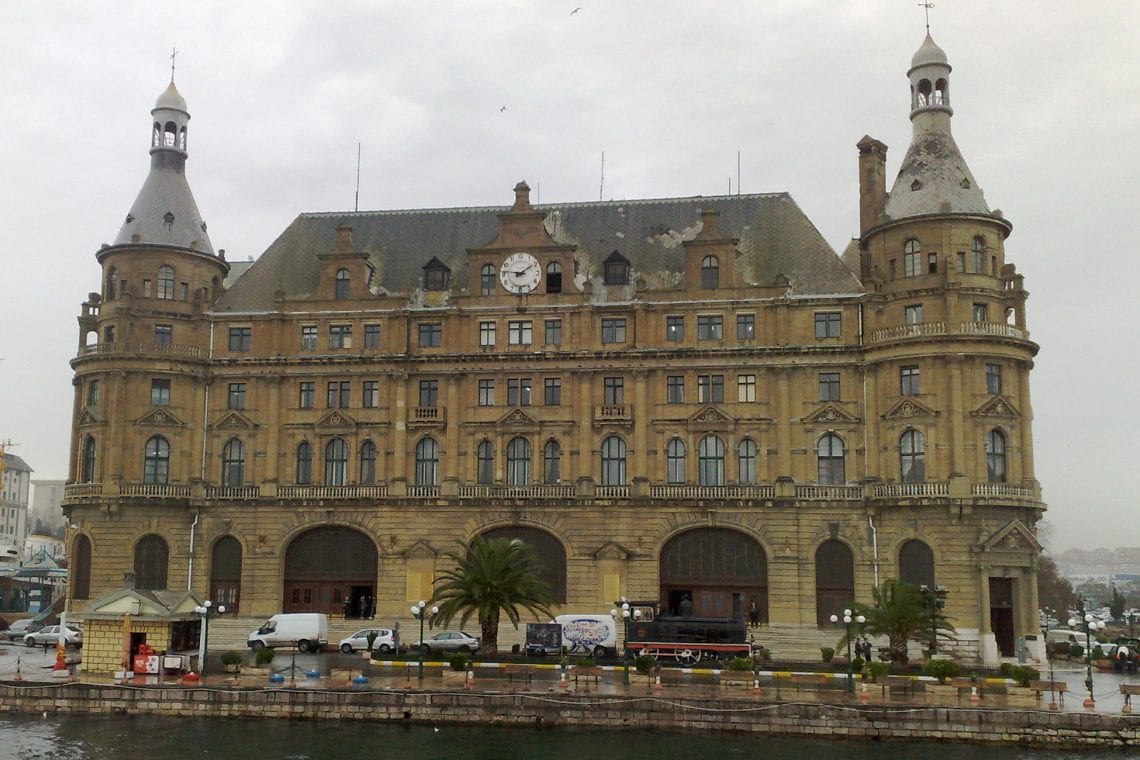
Above: Galata Tower | Haydarpaşa railway station | Crossing the Galata Bridge in heavy rain
We just about make it on time, buy our ticket and board. Our destination is Adana, normally a direct sleeper trains could take us but due to rail upgrades (to high speed rail) we’ll have to make a detour and change at the capital Ankara where we’ll board a sleeper train. The journey is a comfortable one, as the charming, slightly dated wagon weaves its way through gorges, and passes motorway construction projects that can be seen cutting there way through the rocks. The terrain levels out and over four hours pass before we arrive at Ankara, time for a quick kebab with some traditional Turkish tea before we board our sleeper service to Adana.The compartments are clean and modern, easily rivalling anything we have back home. The comfort can only be highlighted by the presence of a fridge with a few complimentary snacks and drinks, as well as a pair of Turkish Train Line branded slippers, which are ours to keep. As the sun sets, and darkness falls we visit the dining car for a few pints of Turkey’s Efes larger before we retire to our bunks to be gently rocked to sleep by the clickety clacks of the undercharge as our train steams into the night.The next morning we woke refreshed to beautiful green meadows below us. It takes me a few moments to realise we are actually precariously making our way along a steep mountain wall. We’ve no idea how far we are from Istanbul or how close to Adana, but it doesn’t seem to matter as we continue to wake from our slumber. It’s around 10am when we arrive at the town of Adana, a city of over a million inhabitants not often mentioned in tourist circles. Unfortunately we weren’t about to add anything that hasn’t already been mentioned as we’ve not much time to hang about. We need to make our way to the main bus station, fortunately there always seems to be a convenient taxi waiting at a train station no matter where in the World you are. We hop in and instruct the driver to take us to the ‘Otogar’ – It’s times like this that I’m glad I learned a few words in Turkish before our adventure as the further east we travel in Turkey it seems English is less spoken … or understood. It’s a good 10-minute ride before we are dropped off at the city bus station and surprisingly we find out way to the correct bus easily. We board the coach bound for Antakya.
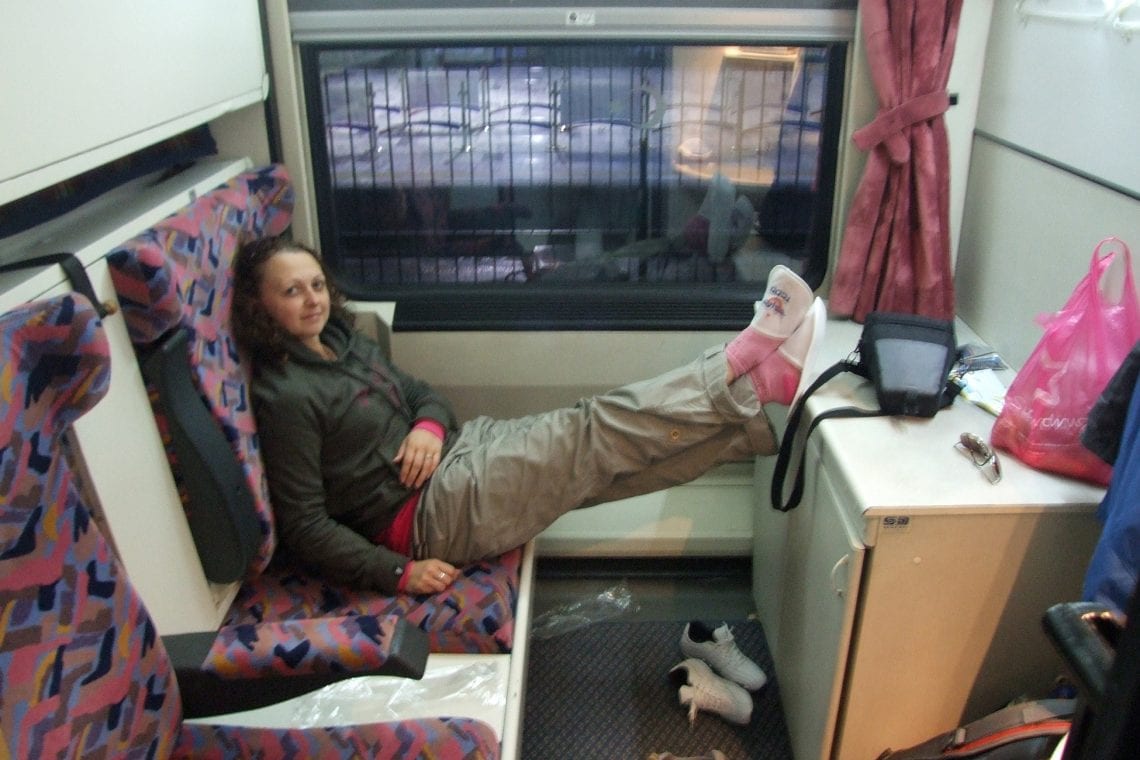
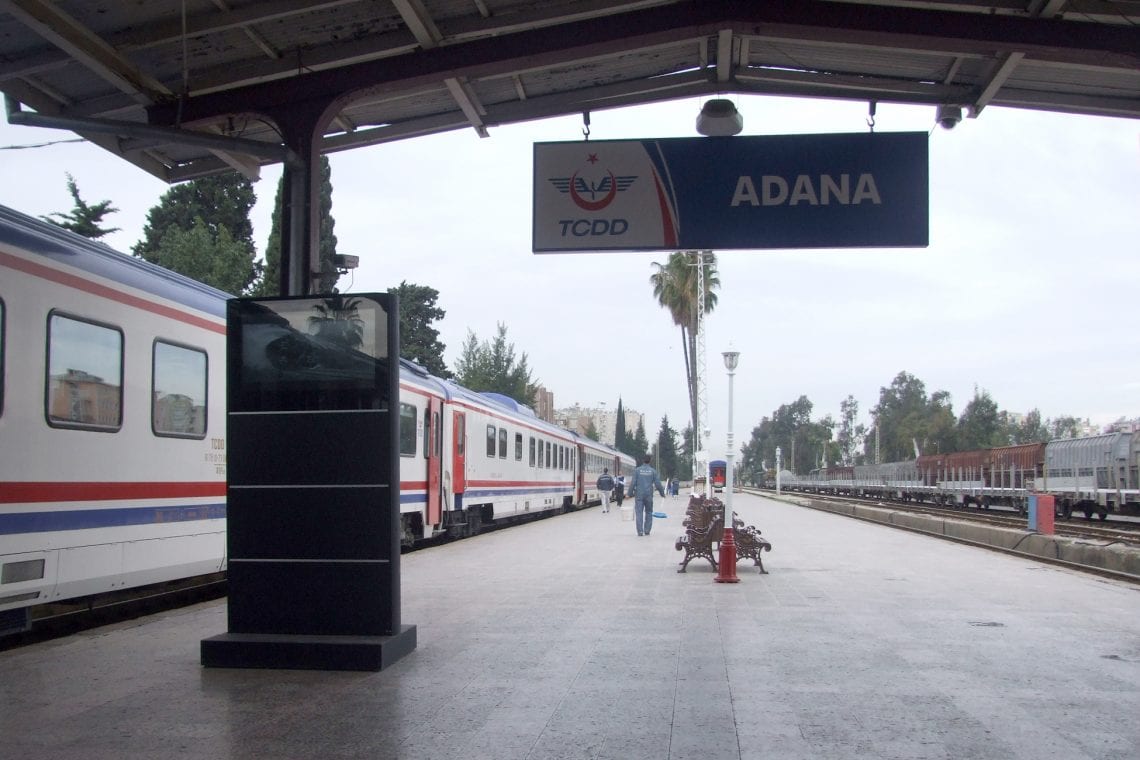
Above: The train journey through the Turkish country side is really pleasant | Getting comfy in cabin on our sleeper train | Adana train station
I’m genuinely surprised at the level of luxury these coaches offer – the seats are like arm chairs, built in small screens in the seat backs entertain passengers, all for a very good price. It’s a 3-hour coach journey and we arrive in Antakya – our destination for the day. At first Antakya seems a bit rough around the edges, but it is not until we spend a few hours here wondering the streets that its charm begins to sink in. Set along a backdrop of mountains the city centre boulevard runs along the river, nestled within with vertical concrete embankments. The whole area is steeped in history and tales of crusades, its own republic and believe or not it is also said to be where the followers of Jesus Christ were first called ‘Christians’, fitting that we’d arrange to spend the night in an old Catholic Church. We arrive only to disrupt an afternoon service consisting of the padre and two other people – awkward to say the least. We enter the chapel and stay for the remainder of the service. It comes to an end with the customary ‘Amen’ and we’re grabbed by our hands and taken to our rooms. Clean, comfortable and refreshing, they open into a peaceful courtyard where the sounds and bustle of outside are kept at bay, giving me a sense of protection. We’ve spent such a short time here and I almost don’t want to leave, but the schedule which I’ve put together months prior to this trip dictates that if I want to see as much as possible as quickly as possible it’s time for another coach journey – onward to the Syrian Arab Republic.
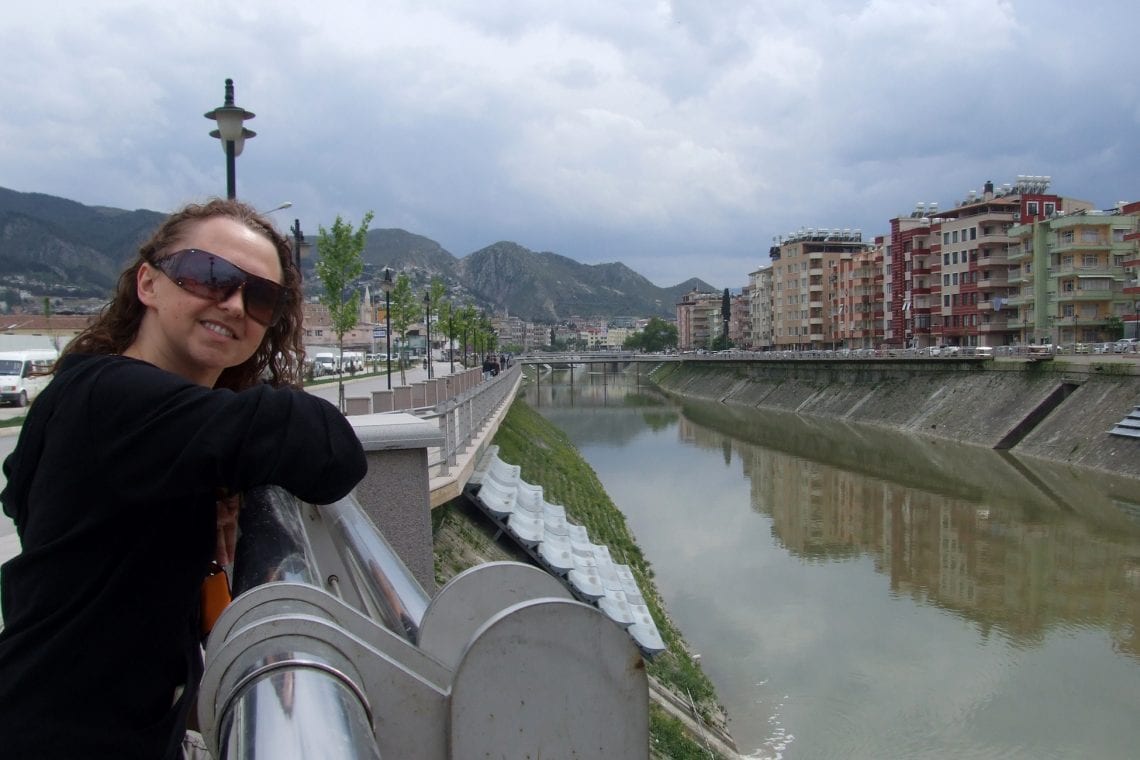
At the time of our trip, Syria’s political unrest had just about started, though nowhere near as bad as it would escalate months further down the line. However, already at this stage it was proving hard to come by an insurance company who would take this risk on. Finally we agreed to forfeit the promise of repartition/evacuation but should we be hurt, they would pay the medical bills. It’s always better to be alive and in a danger zone rather than dead in a safe zone. It’s another two hours to the border where we’re ushered out of the coach. No clue where to go, what to do, but it seems the bus driver is familiar with tourists and he adopts us like lost Western children and escorts us to the relevant building and the correct desk to be met by the border officials. All in all it’s a straight forward process. Many questions are fired at us, with the topic of the day clearly being whether we are under cover reporters (I wish I was). ”You work for Hello magazine?” rings around and constantly echoes; the officials clearly wanting to try and catch us out. With nothing to hide we’re back on the bus as it twists through the rolling hills and onwards to Aleppo.
DO NOT GO TO SYRIA
Syria is currently a war zone and any attempt to cross it by land will most likely result in death. If you’re interested travelling this route, it may be a viable option to skip Syria by flying from Adana in Eastern Turkey to Amman but always check with the what the FCO recomend.
Getting lost in Aleppo
Aleppo, Syria’s second city is magnificent – as we stand by the Bab al-Faraj clock tower clearly looking lost, a young local student asks us if we need any help. We explain we’re interested in seeing the city’s famous Citadel, he offers to walk us there and we make small talk along the way. When we first make eye contact with the citadel, we’re amazed by its sheer size; it’s massive, intimidating and beautifully preserved. It’s considered one of the oldest and largest castles in the world. The site’s been used as far back as the 3rd millennia BC. The citadel, which currently occupies the hill dates back to the 13th century.
For only 10 Syrian Pounds entry is gained and we walk up the intimidating bridge over a dried moat to the enormous stone archway. The mammoth structure is as impressive from the interior as it’s from the outside; it’s essentially a city albeit the ruins of a city with even its own amphitheatre. Walking along the thick stone fortified walls you see modern Aleppo sprawling into the horizon. Afternoon prayers are sounded from the surrounding mosques minarets; you truly get a sense of a different world. Couples sitting in the shade, families on days out wounding round with no westerners in site, it’s a great way to spend the afternoon immersed in history.
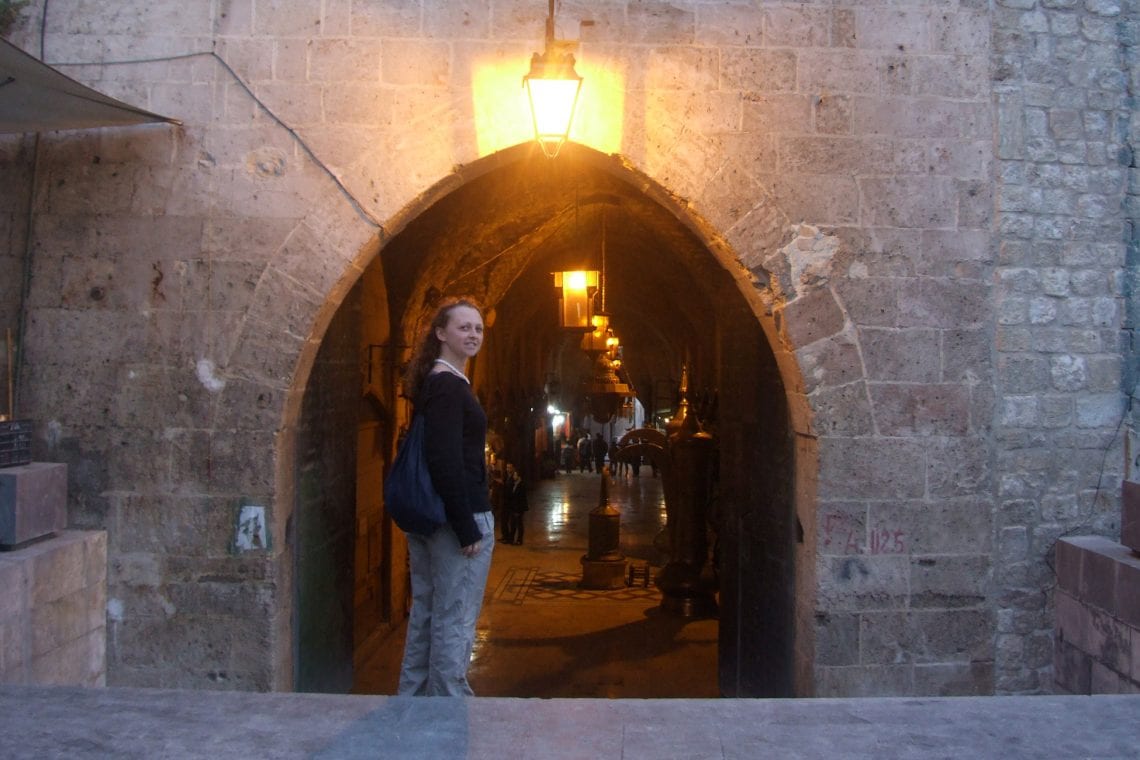
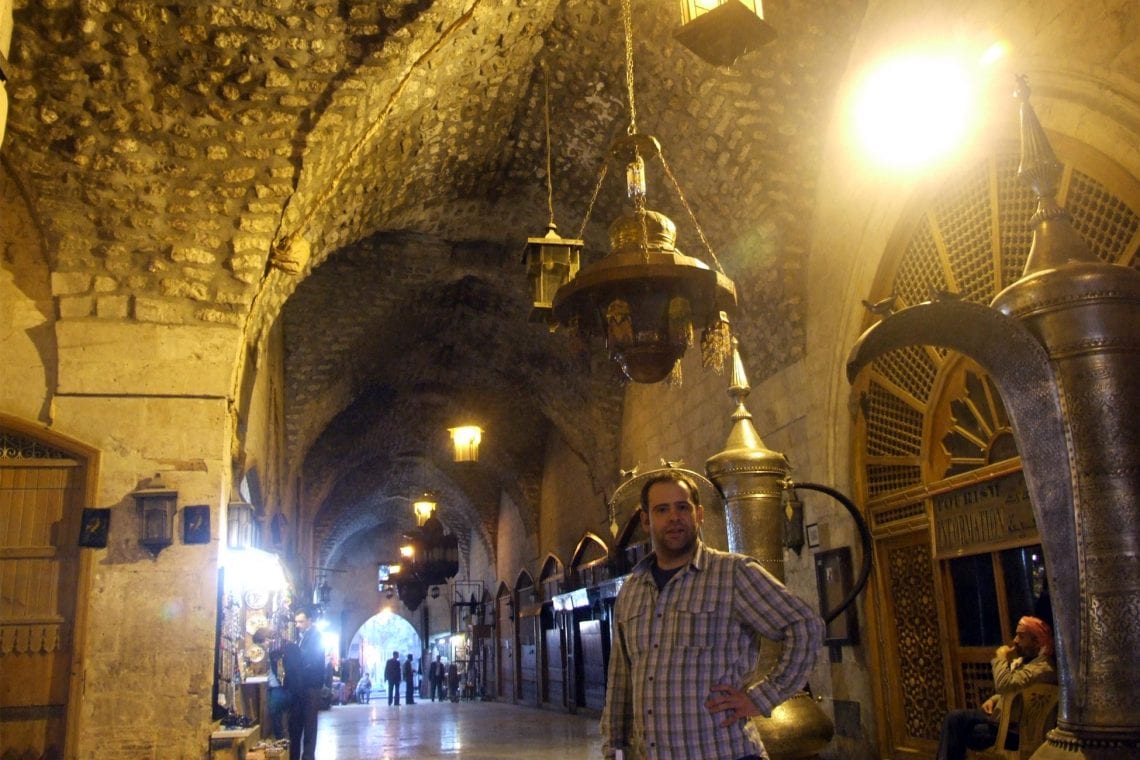
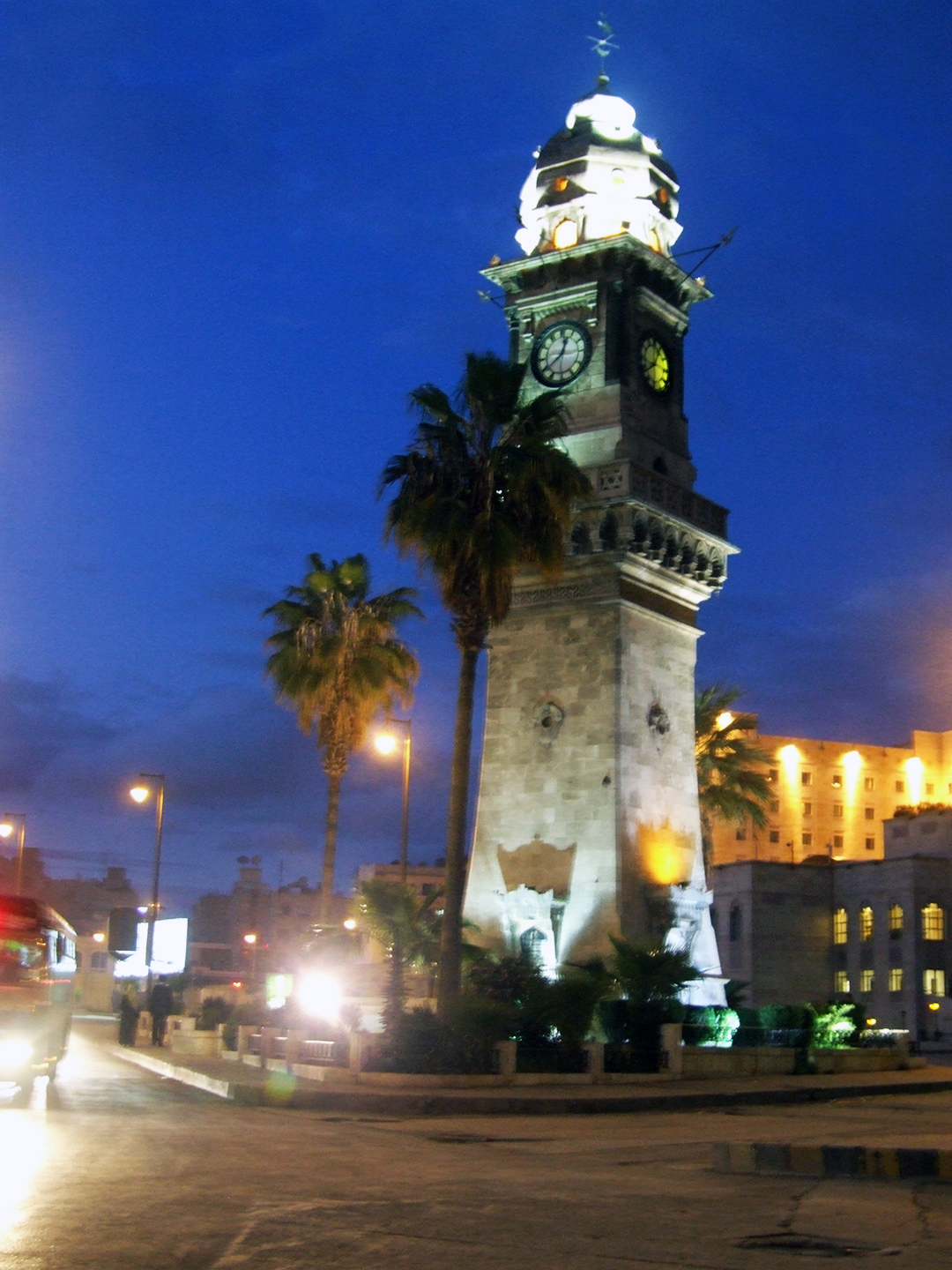
Above: We spent hours exploring Aleppo’s Citadel with views of the city | Aleppo’s souk | Bab al-faraj clock tower
Exploring Dead Cities
The next day we’ve arrange for a driver to take us for a tour of some of Syria’s Dead cities; Aleppo is an excellent base to explore these sites. We spend most the day being driven from one to another while our driver waits till we’ve had our fill. The Dead Cities are scattered along Syria’s North West region and are the remains of a past civilization, long dead and forgotten. It’s claimed that 40 ancient Christian Byzantine settlements dating back to between the first and the seventh century make up Syria’s mysterious Dead Cities. Surprisingly, yet somehow quite fitting, the modern world has forgotten about these incredible and well-preserved ruins. Even UNESCO (United Nations Educational, Scientific and Cultural Organization), it would seem, has overlooked these sites up until 2011, when they were finally recognised as a World Heritage Site.
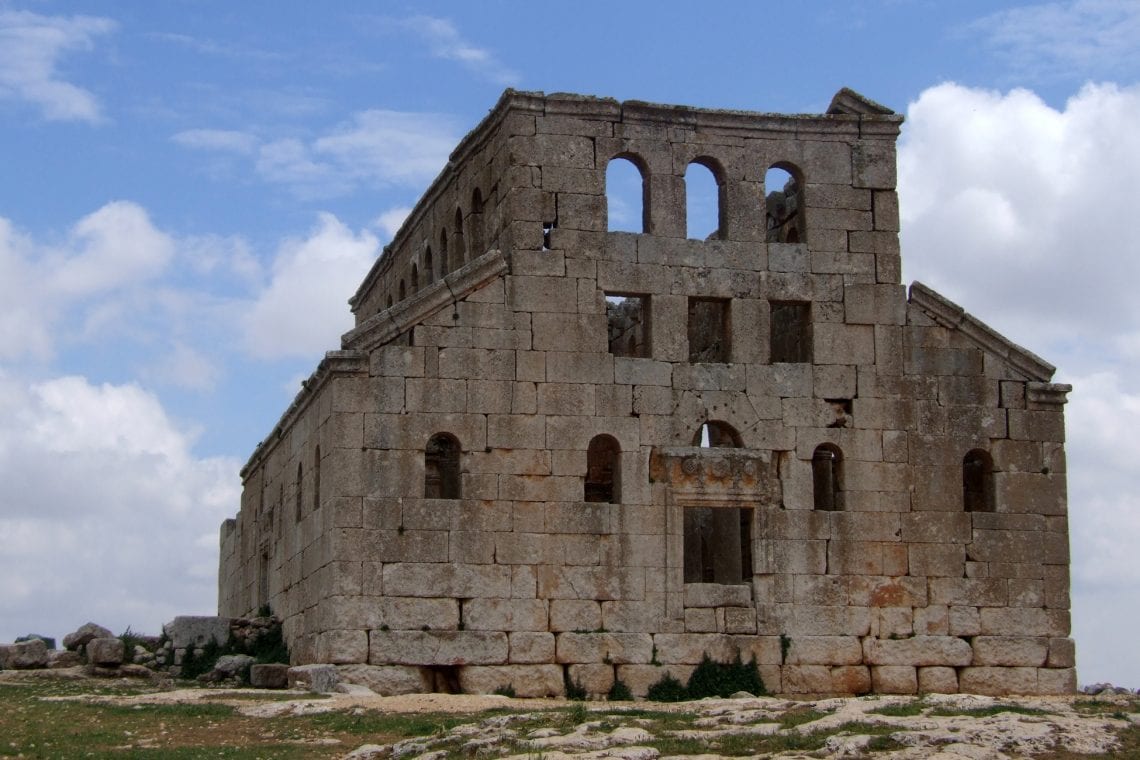
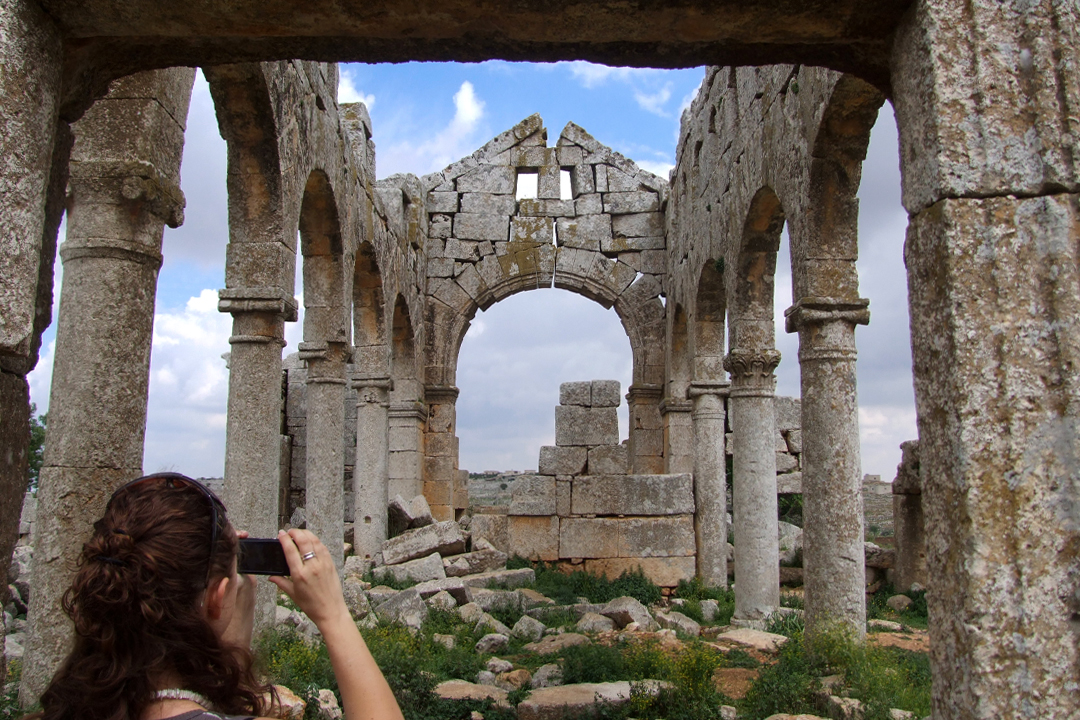
Invading Krak des Chevaliers
The following morning it’s time to move on from Aleppo and in the morning we find ourselves at the cities bus station again, boarding the bus to visit an amazing castle that I’ve read about. We’re in for a two-hour local bus journey to the city of Homs – here it’s a quick transfer onto a Toyota minivan to which we’re easily directed by the local bystanders elaborating ‘KRAK? KRAK?’ – it seems they are very familiar with the touristic itinerary, which thousands have taken before us, shattering any illusions that I’m any kind of trailblazer. It’s a 40 minute ride before we’ve reached the Krak des Chevaliers, a 12th century crusader castle atop a 700 meter high hill surrounded by lush green valleys below. The castle looks like it could be a page ripped out of a fairy tale book from England’s middle ages; you’d have no idea what you were in the Middle East looking at this scene. Lawrence of Arabia described this as perhaps best preserved and most wholly admirable castle in the world and who am I to disagree with that sentiment. Basking in the sun atop of one of the towers, we’ve virtually had the whole castle to our selves, with no health and safety signs, we’re free to explore every nook and cranny of this ancient fortification.
The tranquillity is interrupted by the sound of my ringtone. I grunt but I see it’s my brother back home in the UK. I pick up, he informs me that Syria has once again made the headlines and border closures are expected, the FCO (Foreign and Commonwealth Office) is advising all its citizens to leave ASAP! Ah, this puts us in a difficult situation, we’ve not seen any evidence of this civil unrest and everyone we’ve come across has been kind and more than helpful. Emma and I think about what options we have, stay as planned or leave Syria early. It’s hard as we’d still wanted to see the amazing Roman ruins of Palmyra and experience Damascus, but we decided not to push are luck and we agree that tomorrow we will aim to head straight for Jordan.There’s nothing like the news of a possible civil war in a country you may be trapped in to slightly elevate your heartbeat. I try not to spoil my mood as we dine at the Bebers Hotel overlooking the Krak. We turn in for the night early as tomorrow is bound to be a long day, we just don’t know how long.
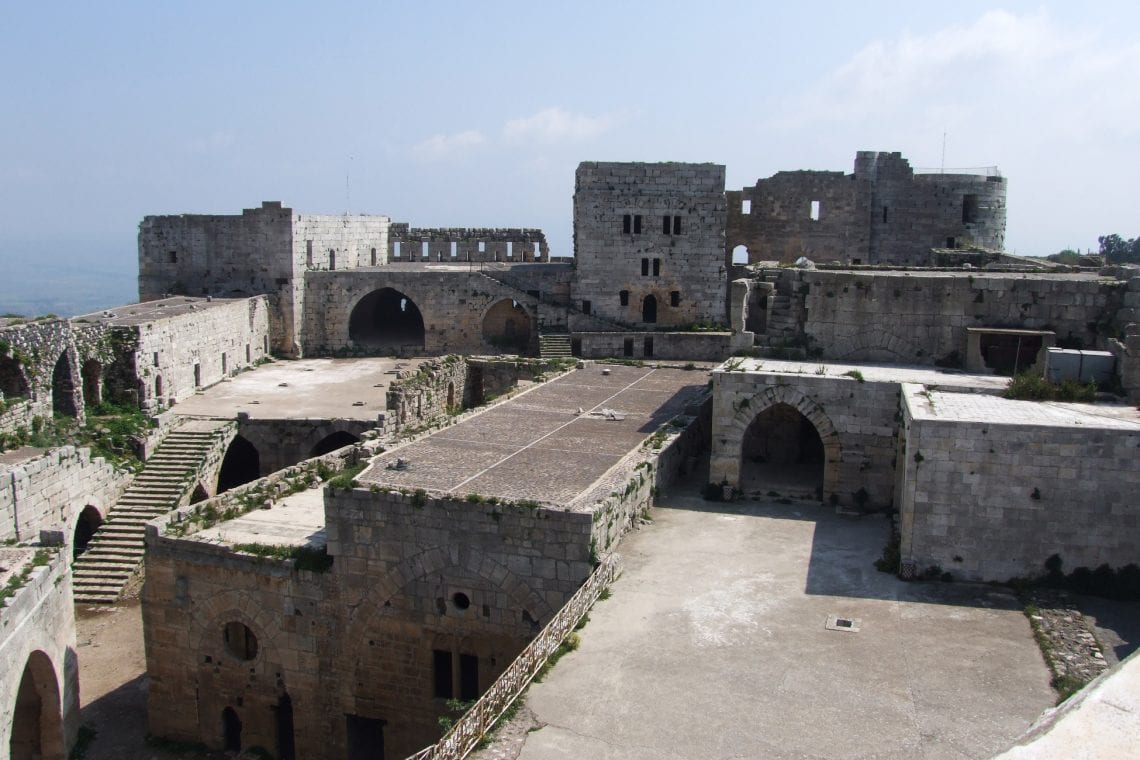
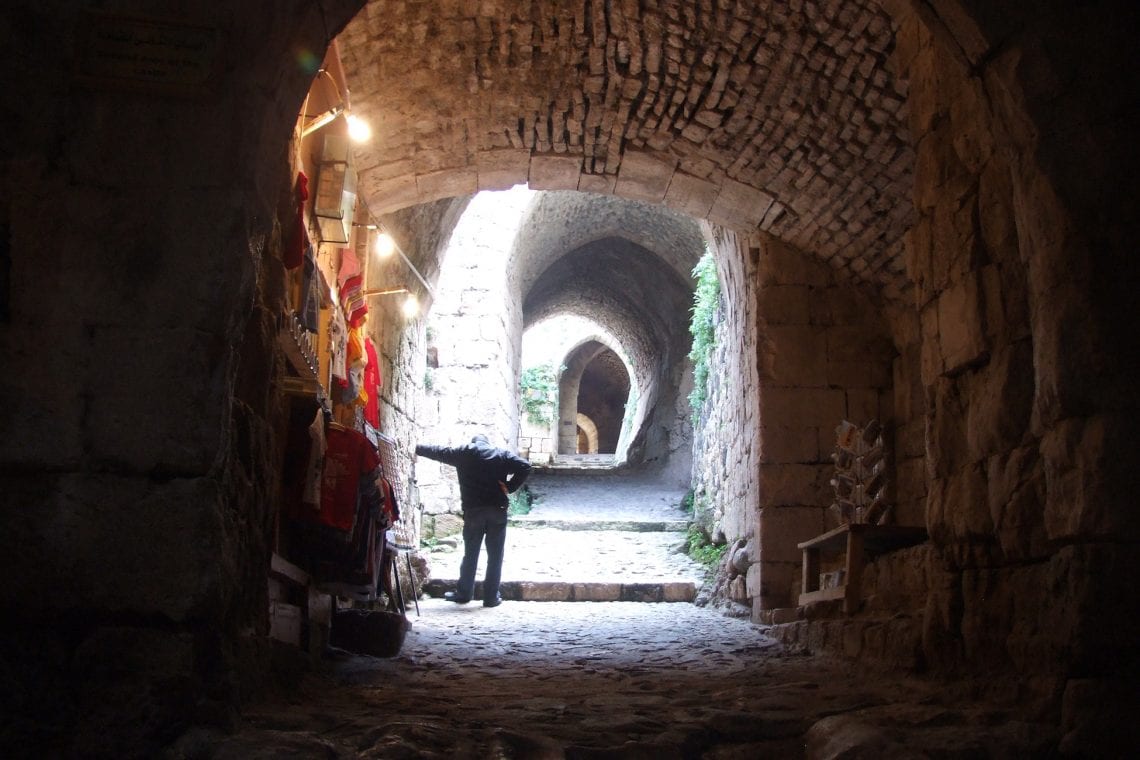
Escape from Syria
It’s early morning and our minibus drops us back at Homs, here a local bus takes us to the bus station in Damascus. Incidentally it’s worth noting that so far all bus stations we’ve seen in Syria are never conveniently located to the centre of town, they’re normally a far while out with mini buses shuttling you in and out. This means we don’t actually see any of Homs or Damascus when we arrive there. It’s early but the place is quite busy with the everyday hustle and bustle that we have begun to expect. At the bus station we’re greeted by police who offer to take us to their small office on site, they examine our passports and ask about our plans. Then politely they hand our documents back and say, ‘Welcome to Syria’.
In the bus station we’re told there are no buses to Amman, Jordan, and that they’re all leaving for Lebanon. There’s a taxi driver who is willing to take us to Jordan, but only once he finds two more passengers for his Mercedes – we’re in for a boring wait. Finally two Jordanians answer his Arabic calls for passengers bound for Amman and they jump in. We’re expecting an uneventful and tedious 3-hour drive…. we were wrong.
Southbound on a well-maintained motorway, we slow to approach a military checkpoint. Not much out the ordinary given the countries circumstances. Our driver exchanges Arabic with the official. Without understanding any of the language I do pick up on the fact that the exchange seems never ending and we’re not on our way, then our two Jordanian passengers get out the car and join the conversation. Sitting in the back of the car a bit like a lame duck I begin to notice tanks in the distance and military posts dug into the ground with heavy machine gun units eagerly fixated on turrets. The official reluctantly allows our vehicle to pass but only after about 15 minutes of negotiating, they wave us through. I notice there are no other cars travelling in the opposite direction nor, any behind or in front of us, I to notice my mobile phone reception disappears as we begin to drive past burnt out police cars and charred propaganda images of Syria’s President by the road side.
Ten minutes down the road our ride becomes halted once again. Not by military checkpoints this time, but by burning tires set up as a barrier along the highway, plumes of black smoke emanating high above our position. There are crowds of people chanting, some with Molotov cocktails in hand, others with large bat like objects with nails sticking out of the ends. Our car is swamped with onlookers all trying to have a glimpse inside. Our driver gestures for our passports, which we pass to him, a few individuals in the crowd then inspect them. It’s a tense moment. I have no idea what’s about to happen. Emma is clutching my hand as our passports are returned and we see smiles among the protesters, then waves and shouts of “Welcome to Syria!” and “Syrian people are your friends”! Clearly satisfied that we’re not enemies, they allow us to proceed, the moods changed and they gesture the V sign with their hands; V for victory or peace, I’m not entirely sure, but as we slowly move off I too signal out the back window. We build up speed and continue on southbound towards the frontier up until our driver is signalled to by an oncoming driver. We quickly come to another stop. They both exit their cars and meet in the central reservation. A few minutes later he returns, gets in the car, and abruptly turns back and shakes his head. “Finished” he says as he turns the car around – it would appear we’ve missed our opportunity to ‘flee’ Syria overland.
Back we go, past the protesters again, past the military checkpoints again and eventually dropped off in a suburb of Damascus with a collection of travel agents and airline company offices on the street. It’s refreshing to finally meet someone who speaks English, here I buy Emma and myself a ticket on the next available flight out of the country, to Amman, early next morning with Royal Jordanian Air. We spend a night in a hostel and have arranged for a taxi pick up in the morning to Damascus airport. Flight time is an estimated 40 minutes to Amman.
Hello Jordan
On arrival, past the immigration I turn my phone on to see loads of missed calls and messages from home with worried friends and relatives. I’ll soon get in touch to let everyone know all is fine but first we make our way to the neatly arranged car hire kiosks to see if there’s anything reasonably available to help us make our journey onwards. Once the paperwork is completed we’re let loose on the roads in our blue Kia Rio, our destination, the quiet town of Madaba. Madaba is known as the Mosaic city, the town itself is easily explored on foot within a day. We buy a pass which allows as access to the large number of archaeological sites and parks and leisurely make our way along the route suggested in our Lonely Planet guide. Some of the highlights include the Greek Orthodox Basilica of Saint George where a 6th century mosaic map of Jerusalem is embedded in the flooring of the church. You don’t have to be an expert to admire these mosaics. At one site we really luck out as the guide keeps us behind one of the short tours, he looks around and gestures at the SSHH sign before us, pulling out a container of water, and spraying part of a huge mosaic on the floor. Now the colours truly come to light as the sun reflects from the wet individual coloured tile fragments. A wipe with a dump cloth makes all the difference!
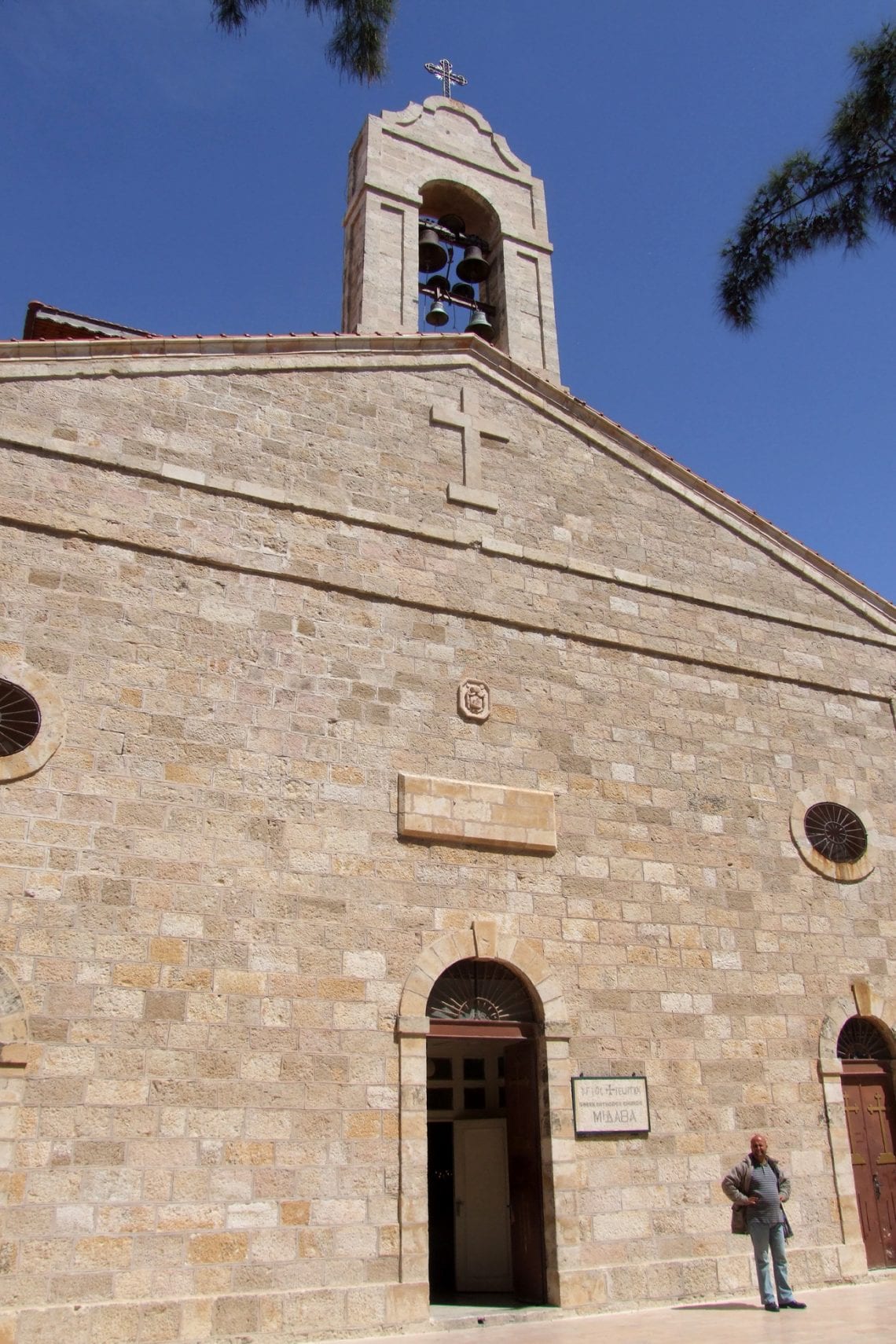
Above: Basilica of St. George | Viewing of some of Madaba’s ancient mosaics
Madaba is well maintained, with plenty of small souvenir shops selling everything from ashtrays of dictators, to full-blown furniture and of course wonderfully crafted mosaics for hundreds of pounds. We spend a night here before the next stage of our adventure. From Madaba it’s a short drive though the Desert to Mt Nebo, where we make a short break. Mt Nebo is where the Bible tells us Moses first laid eyes on the Promised Land, and it’s pretty busy with tourists when we arrive. There’s a visitor centre and museum on site. It’s not hard work to reach the peak, a well-laid path, which takes us to the top viewing area where pilgrims can set eyes on the Promised Land. The wind breeze provides relief from the scorching sun, numerous tour groups arrive and it begins to feel crowded. We make are way back to hear groups reading passages from the bible while other groups sing hymns. It’s a short 20-minute break for us before we take to the road again.
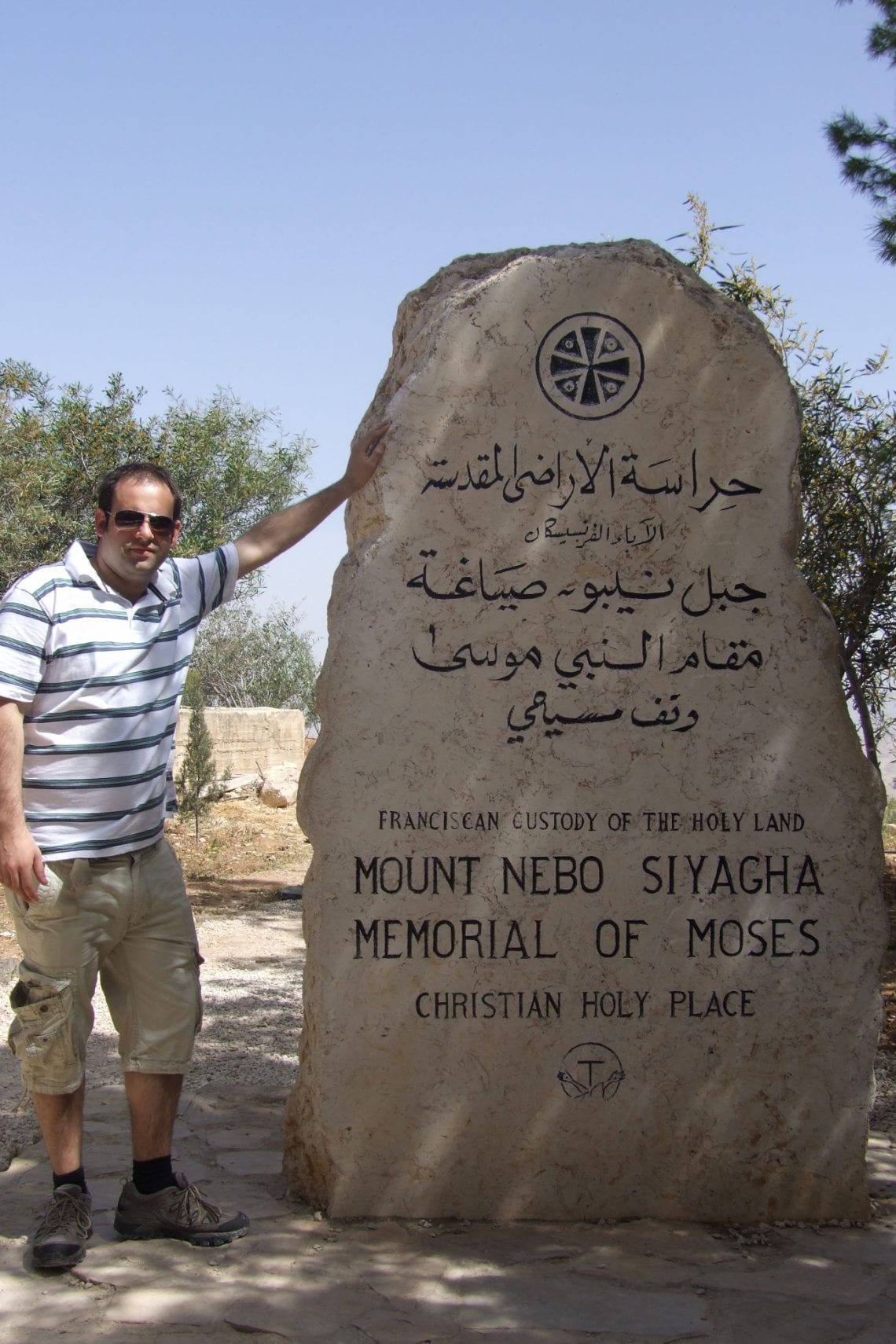
Good tarmac twists and turns downwards though the rolling hills; in the distance we see the sun reflecting on a huge body of water. It’s the Dead Sea.The road leads right up to the shore and we follow the coastline up to Amman Beach where we intend to cool off for the afternoon. The sun begins to take its toll on our comfort. Amman Beach is located about an hour from the city. This is an official resort and entrance fee of 16JDs gains you entrance to the complex; consisting of pools, lockers, and off course the beach. This is where both tourist and local Jordanians visit from the city. Of course there’s nothing from stopping us driving a few miles south pulling over by the coastline and jumping in to the sea without the need of paying for the privilege, however the Dead Sea is ultra-salty and the last thing we’d want is constant itchiness of salt on our body’s as we drive to Petra later in the day. We’ve all seen images of people floating in the Dead Sea due to its salinity, but I must admit I was rather sceptical as I ran across the scorching sands into the water. However once I’m submerged in the warm waters I feel the strange sensation of my body wanting to float, so I simply fall backwards to be instantly lifted by the salty waters’. It’s really strange how easily you float. It’s a fun few hours and our backpack trip begins to feel like a holiday. The waters are warm, and not as refreshing as I’d hoped but the showers to wash the salt off prove refreshing enough.
From the Amman Beach it’s a long boring drive to our final stop for the day, the town of Wadi Masi, home to the legendary Petra. The Dead Sea Highway runs along the Dead Sea for what seems like hours. The heat takes its toll. Our Kia, not being equipped with AC means we both are dripping with sweat. It’s early evening until we reach the Valentine Inn and just in time for a well-earned beer or two.
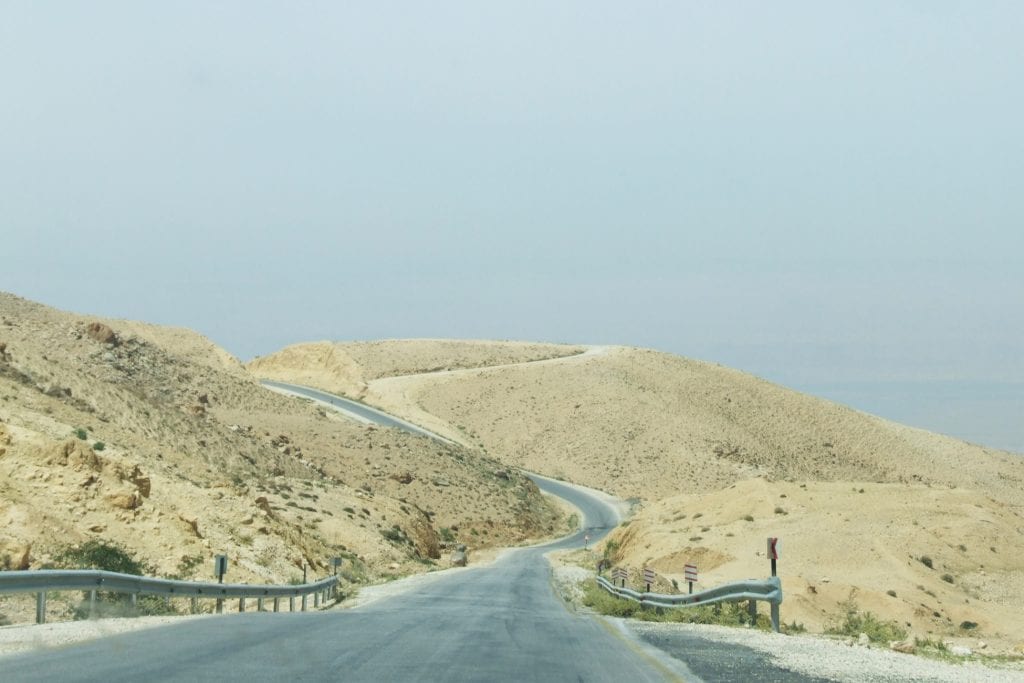
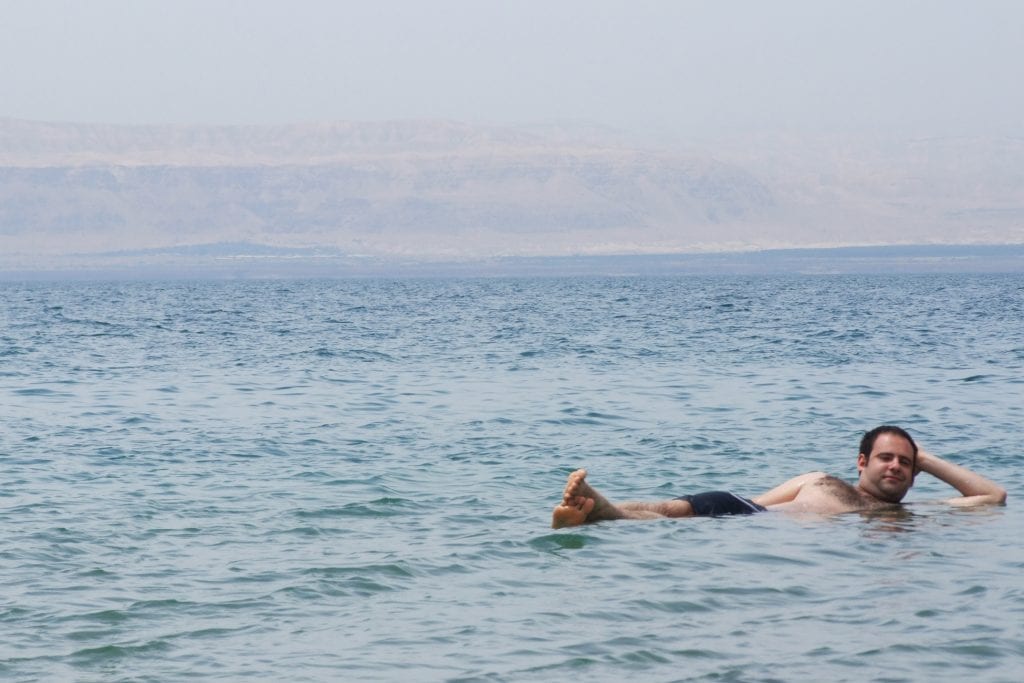
Above: As we gain altitude it’s a slow pace up the steep rocky terrain with occasion navigating snow and ice
Visiting Petra
Petra is truly an incredible site, the trick is to get there early in the morning, before the crowds, before it gets too hot, but also aim to arrive at the wonderfully preserved treasury a little before 10am as that’s when the sun hits the façade and the different shades of reds, oranges and browns astonish visitors as they emerge from the Siq canyon to be met by this wonder. We progress slowly as we’re mystified by every cave and outcrop. It takes us 4 hours to make it to the Monastery at the end where a perfectly positioned cave provides shelter for a pack lunch with a fantastic view. Unexpectedly it begins to rain during our walk back, this does little to ease the afternoon heat, merely adds humidity to the experience.
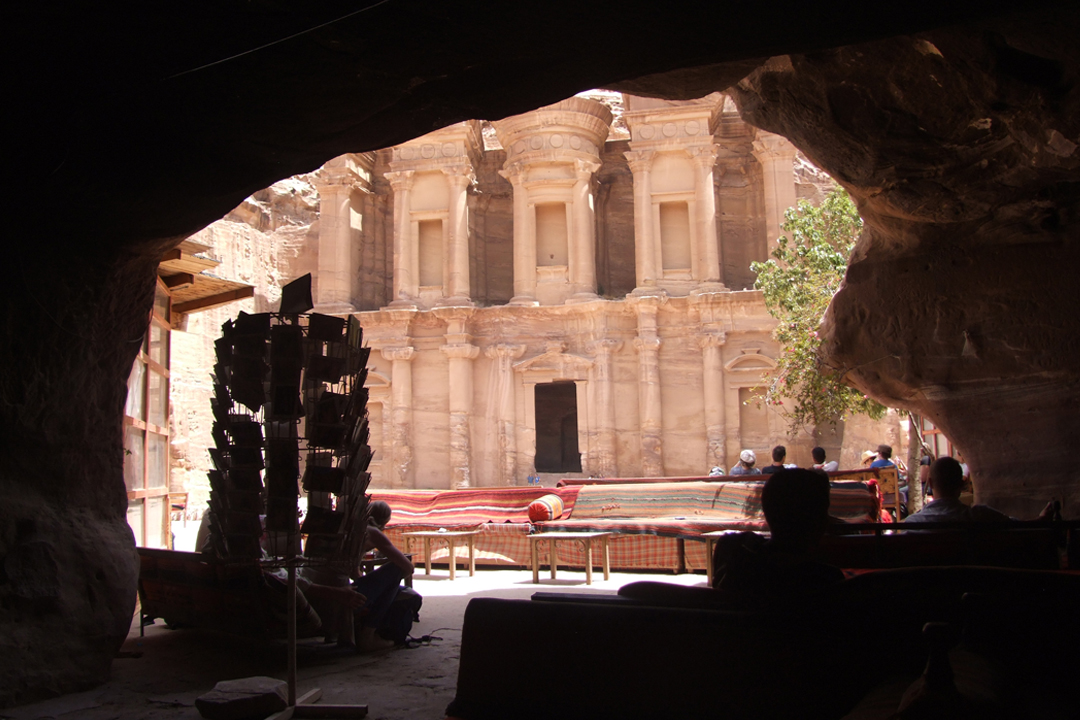
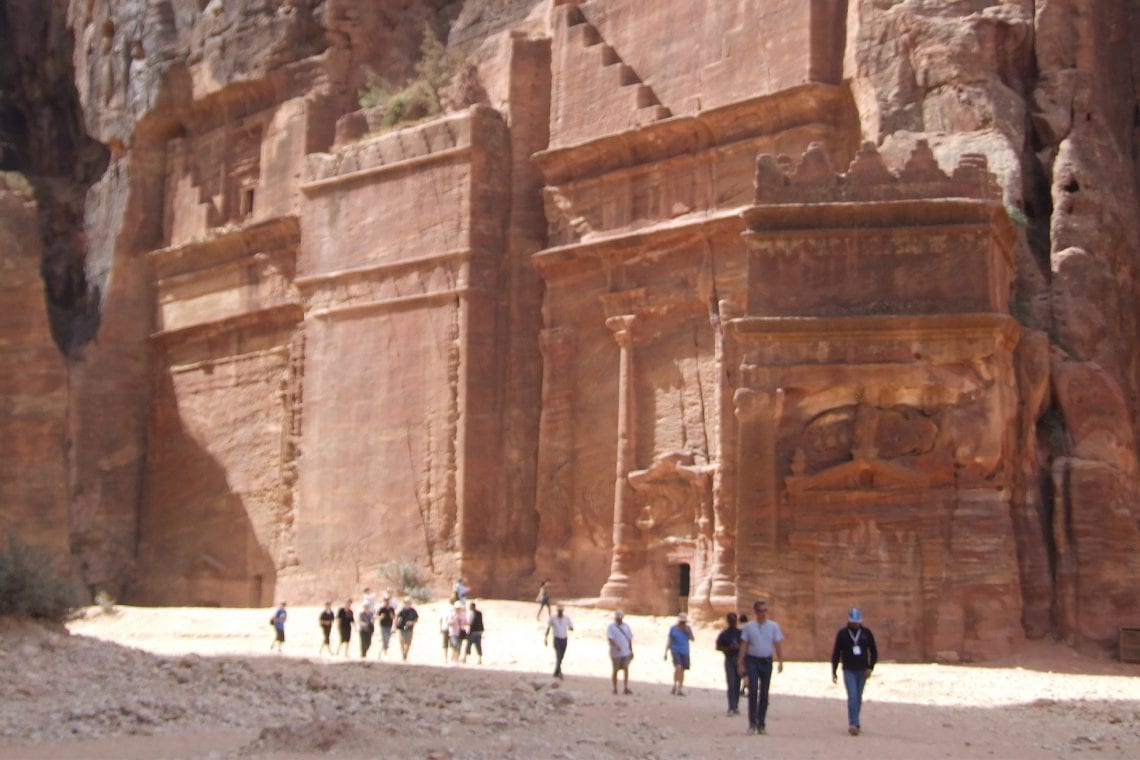
Leaving Jordan for Egypt
From the town of Wadi Masi it’s about a two hour drive to Jordan’s second city and access to the ocean, Aquaba. We drive in to town without any clue where we should be heading but we’re channelled though various diversions and one way systems. It’s with some chance we end up by our hotel. Aquaba is really an overnight place to bed down for us. We call the rental car people knowing where they can pick up their Kia, leave the keys at reception and head into town on foot to find a ticket office so that we can catch our ferry the next day to Egypt. We wonder around town, asking locally where we can buy tickets, enthusiastically everyone we come across is polite and eager to direct us, this in practice does not get us to our goal any sooner. Again, almost buy chance we see a shop front with pictures of ferries. Upon entering we enquire for a boat for tomorrow, where after some gesturing we’re told to come back later. Later indeed, a different gentleman agrees to sell us tickets, tickets for a 6 hour slow cargo ferry which we must upgrade at the port for the fast boat which takes significantly less time. It seems like a totally roundabout way of doing things, but at last we can relax with the thought that tomorrow we set sail to Egypt. We spend the evening wondering on Aquaba beach; it’s rammed with local families enjoying the seaside as we sit on the sea wall with an ice cream and watch the sun set below the Red Sea.
Formalities at the port again seem a bit over complicated, go to counter, stamp, and go to another for another stamp but we manage to board our ferry to Egypt, destined for the small town of Nuweiba. An hour later we’ve not departed, it’s boring and hot. We find ourselves sitting close to a group of other travellers from the UK and together we exchange stories of our travels. An Arabic announcement is made and it’s not long before we finally begin to leave port. As we sail we’re surrounded from three directions by the desert lands of Israel, Jordan, Egypt and Saudi Arabia all within sight. Disembarking we’re herded towards a large warehouse type structure for customs and security checks. It’s chaotic in parts, with little to prevent a lost Westerner just wondering of into Egypt with little more than an acknowledgement from the authorities. We negotiate a fare with one of the many taxis waiting around to take us to the laid back town of Dahab, a half an hour away for a few days of sun, sea and beach.
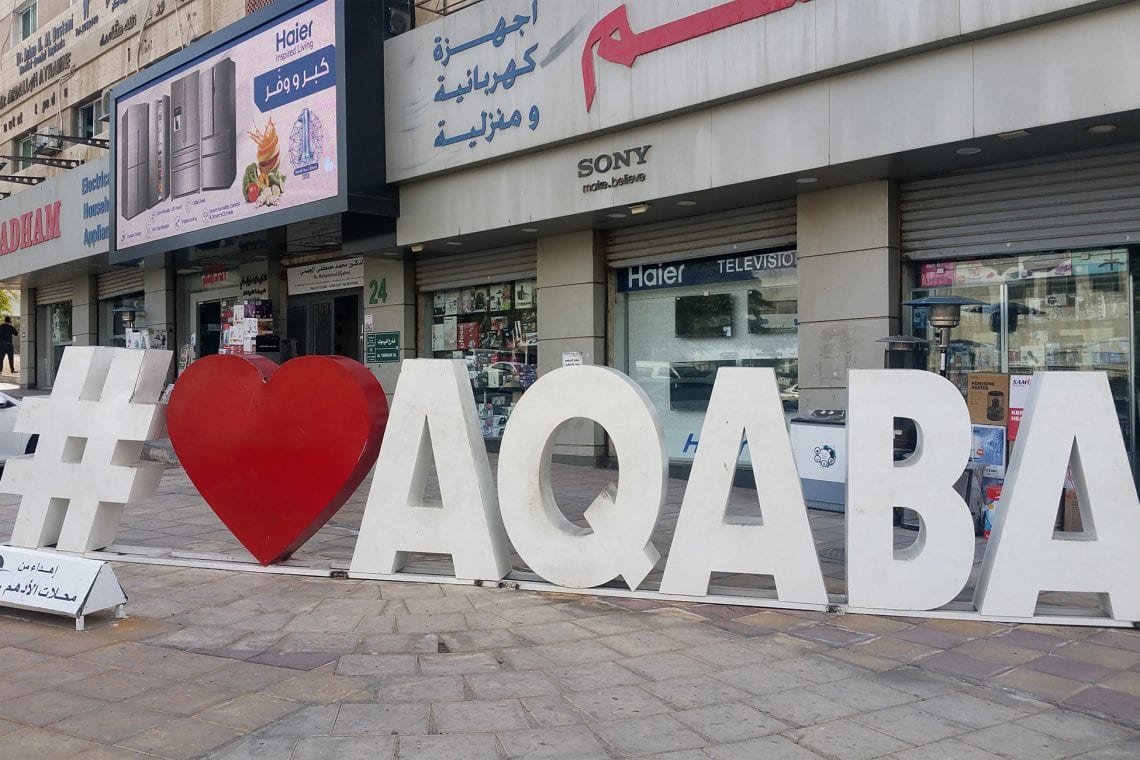
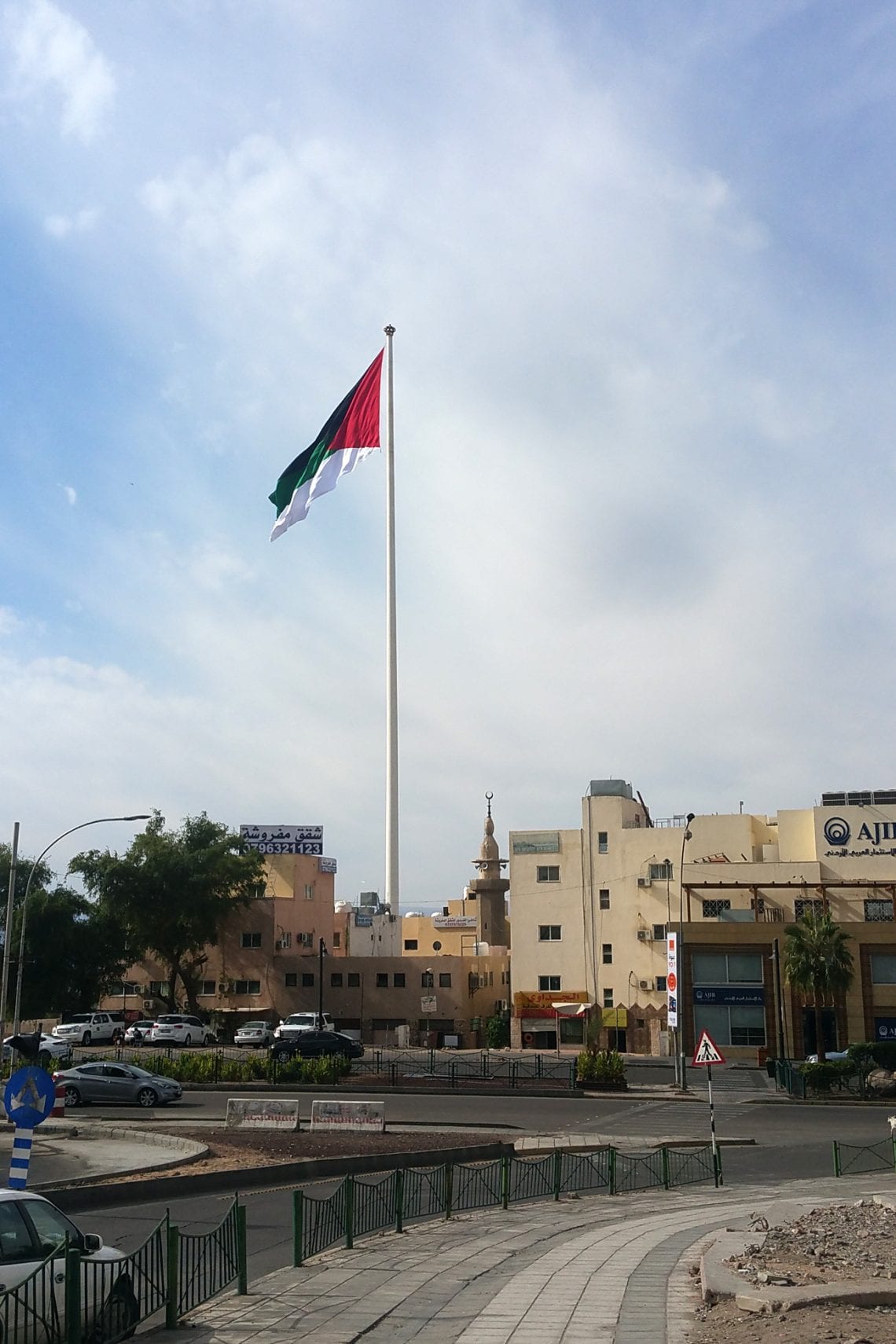
Above: We don’t spent much time in Aqaba, it’s really an evening stop over before we board the ferry in the morning
Resting up in Dahab
Dahab, is about an hour and a half south of the popular Sharm El Sheik resort tourists flock to, but for us our adventure ends here in a few days and we’ll be flying back via the airport. Dahab used to be a very popular hippy retreat and the atmosphere is incredibly relaxed. Bedouin camps line the shores and it proves an excellent base to rest up. There’s plenty to offer all at a lower price than neighbouring Sharm but with much more charm. There are a few 5 star resorts but we opt for something a bit more modest but suitable for our needs as a room sets us back a mere £4 per night at Auski Camp, bargain. Dahab can be a Mecca for diving as well as snorkelling enthusiasts, the vibrant underwater life is completely alien to the senses. Not far is the notorious blue hole, which has claimed enough lives. If you rather stay above the waves then kite surfing is very popular here as is windsurfing.We spend our time relaxing, unwinding and reflecting on our travels over the last two weeks. It’s been a mind-blowing experience. We’ve seen so much yet so little of what this region has to offer a visitor. For us it’s been a tiny spec of sand amidst a massive dessert we’ve sample and we’re eager to see more soon, one day. We have a few more days here so I suggest there’s one more story to tell, our story on how we climbed Sinai located about two hours away.
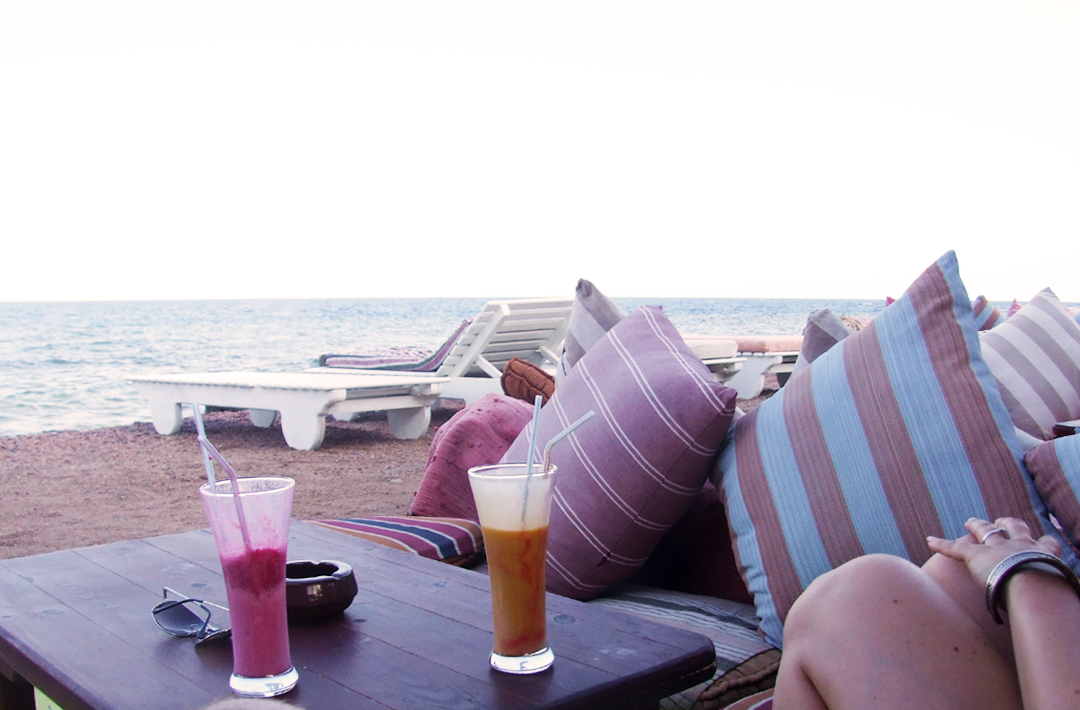
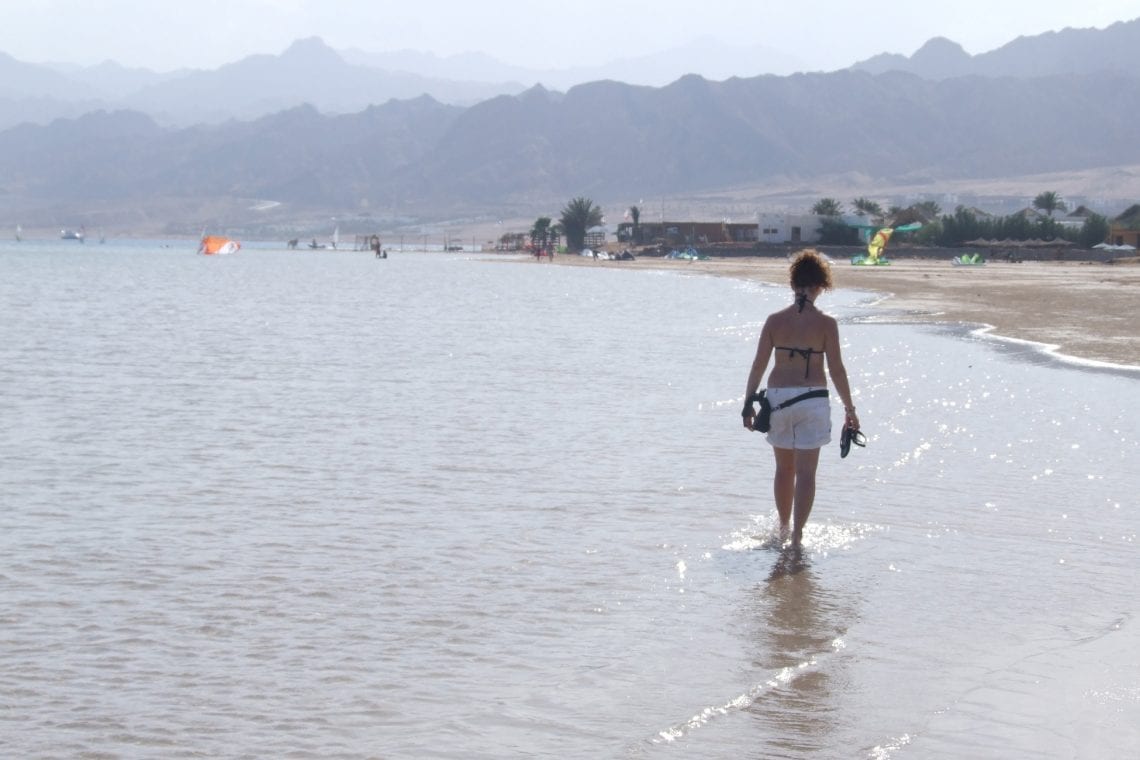
Sunrise on Mount Sinai
Nestled within the southern part of the Sinai Peninsular, Mount Sinai offers an exhilarating climb which rewards you at the summit with some truly amazing views of this mountainous desert region of Egypt. Moses’ Mountain, as it’s called in Arabic, stands at 2285 metres and is said to be the place where God passed to Moses The Ten Commandments.
It”s seldom the primary reason why one might fly to Egypt, but if you find yourself traveling around the Red Sea like we have it makes a great day, or more appropriately night side trip.
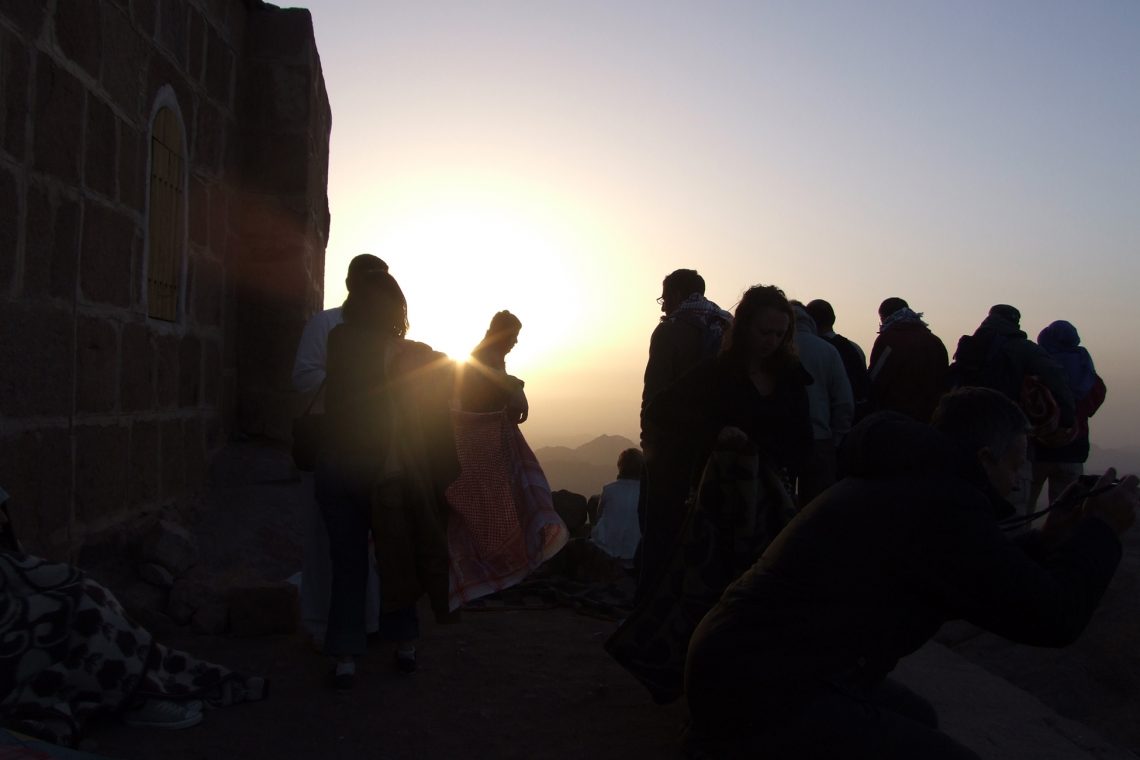
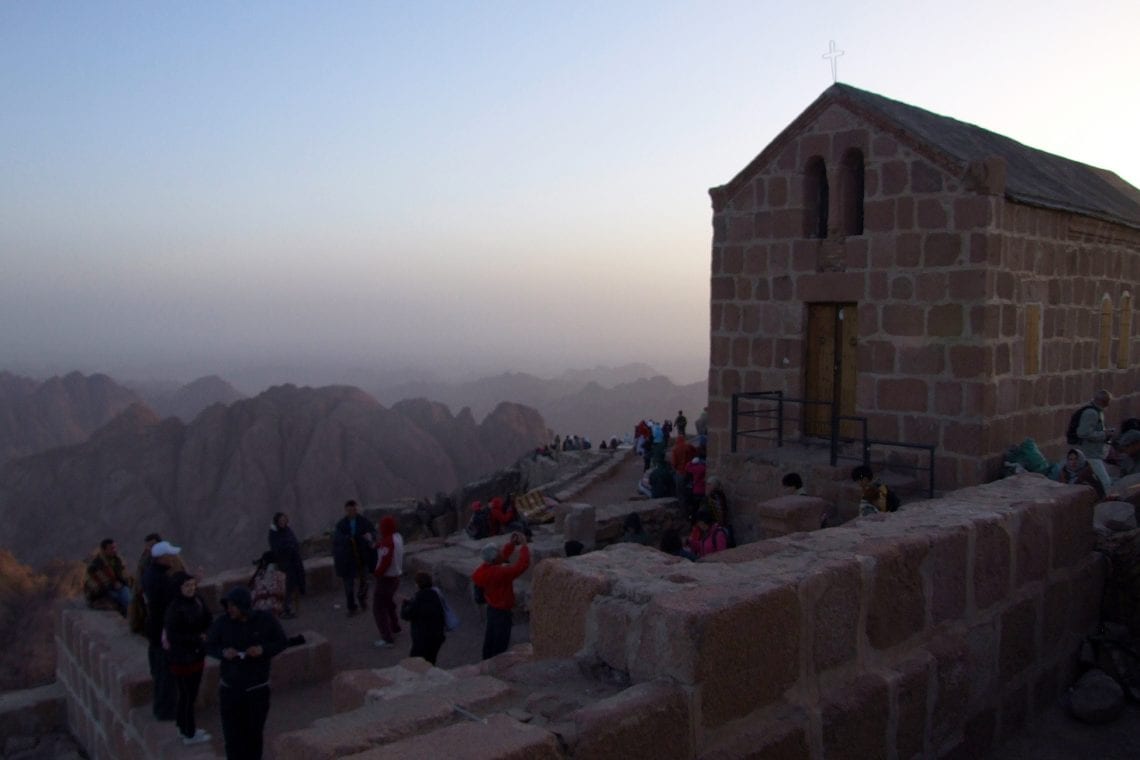
WHERE TO STAY
- Istanbul – Hostel Neverland
- Adana – Catholic Church Guesthouse
- Aleppo – Spring Flower Hostel
- Krak des Chevaliers – Bebers Hotel
- Damascus – Damascus Hostel
- Madaba – Moab Land Hotel
- Petra – Valentine Inn
- Aquaba – Hotel
- Dahad – Auski camp
USEFUL LINKS
- How to get to travel to and from Istanbul to Syria by train: Man in Seat 61
- Book your Aqaba to Nuweiba ferry



